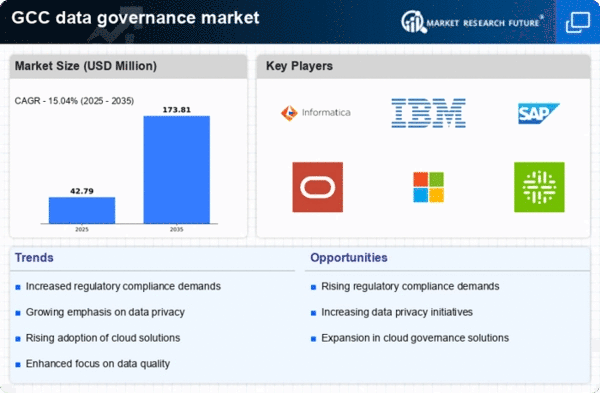Growing Data Volume
The exponential growth of data generated by organizations in the GCC is a key driver for the data governance market. With the rise of digital transformation initiatives, businesses are accumulating vast amounts of data from various sources, including IoT devices and social media. This surge in data volume necessitates effective governance strategies to ensure data quality, accessibility, and compliance. The data governance market is expected to witness a growth rate of 18% annually as organizations strive to manage their data assets effectively. Companies are increasingly recognizing that without proper governance, the value of their data diminishes, leading to potential losses. Thus, the need for structured data governance frameworks is becoming paramount, positioning the market for substantial growth.
Increased Data Breaches
The frequency of data breaches in the GCC is prompting organizations to prioritize data governance. High-profile incidents have raised awareness about the vulnerabilities associated with inadequate data management practices. As a result, businesses are investing in comprehensive governance strategies to protect sensitive information and maintain customer trust. The data governance market is projected to reach $1 billion by 2026, driven by the need for enhanced security measures. Organizations are recognizing that effective data governance not only mitigates risks but also enhances operational efficiency. Consequently, the focus on safeguarding data assets is likely to propel the growth of the data governance market, as companies seek to implement robust frameworks to prevent breaches and ensure compliance.
Rising Regulatory Demands
The data governance market is experiencing a surge in demand due to increasing regulatory requirements across various sectors in the GCC. Governments are implementing stringent data protection laws, compelling organizations to adopt robust governance frameworks. For instance, the introduction of the Personal Data Protection Law in the UAE mandates organizations to ensure data privacy and security. This regulatory landscape is driving investments in data governance solutions, as companies seek to avoid hefty fines and reputational damage. The market is projected to grow at a CAGR of 15% from 2025 to 2030, indicating a strong focus on compliance and governance practices. As organizations navigate these complexities, the data governance market is likely to expand significantly, providing opportunities for vendors offering innovative solutions.
Demand for Data-Driven Decision Making
In the GCC, there is a growing emphasis on data-driven decision making, which is significantly influencing the data governance market. Organizations are increasingly leveraging data analytics to gain insights and drive strategic initiatives. However, to harness the full potential of data, effective governance is essential. This demand for reliable data is pushing companies to invest in governance solutions that ensure data integrity and availability. The data governance market is anticipated to grow by 20% over the next five years, as businesses recognize the importance of data quality in decision-making processes. As organizations strive to become more data-centric, the need for robust governance frameworks will likely intensify, further propelling market growth.
Technological Advancements in Data Management
The rapid advancement of technology is reshaping the data governance market in the GCC. Innovations such as artificial intelligence and machine learning are being integrated into data governance solutions, enhancing their effectiveness and efficiency. These technologies enable organizations to automate data management processes, ensuring compliance and improving data quality. As businesses adopt these advanced solutions, the data governance market was expected to grow at a CAGR of 17% from 2025 to 2030. The integration of technology not only streamlines governance practices but also provides organizations with the tools needed to adapt to evolving regulatory landscapes. Consequently, the data governance market is likely to benefit from this technological evolution, as companies seek to leverage cutting-edge solutions for better governance.
















